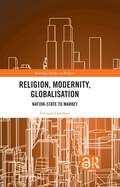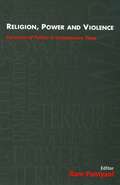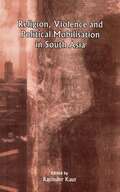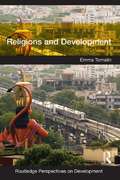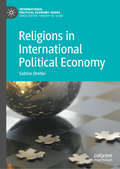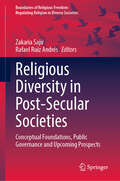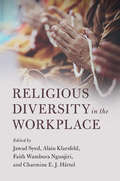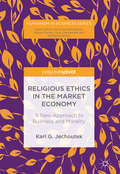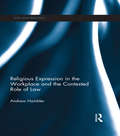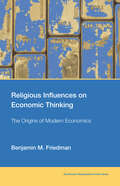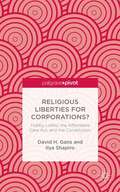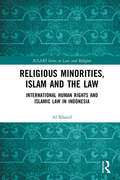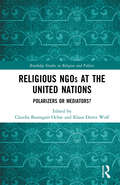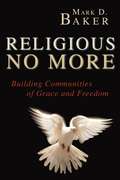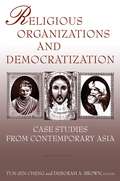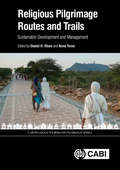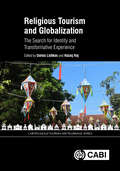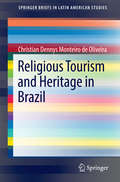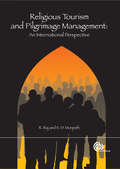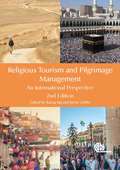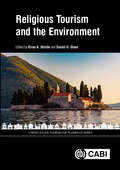- Table View
- List View
Religion, Modernity, Globalisation: Nation-State to Market (Routledge Studies in Religion)
by François GauthierThis book argues that the last four decades have seen profound and important changes in the nature and social location of religion, and that those changes are best understood when cast against the associated rise of consumerism and neoliberalism. These transformations are often misunderstood and underestimated, namely because the study of religion remains dependent on the secularisation paradigm which can no longer provide a sufficiently fruitful framework for analysis.The book challenges diagnoses of transience and fragmentation by proposing an alternative narrative and set of concepts for understanding the global religious landscape. The present situation is framed as the result of a shift from a National-Statist to a Global-Market regime of religion. Adopting a holistic perspective that breaks with the current specialisation tendencies, it charts the emergence of the State and the Market as institutions and ideas related to social order, as well as their changing rapports from classical modernity to today. Breaking with a tradition of Western-centeredness, the book offers probing enquiries into Indonesia and a synthesis of global and Western trends.This long-awaited book offers a bold new vision for the social scientific study of religion and will be of great interest to all scholars of the Sociology and Anthropology of religion, as well as Religious Studies in general.The Open Access version of this book, available at http://www.taylorfrancis.com, has been made available under a Creative Commons-Attribution-Non Commercial-No Derivatives (CC BY-NC-ND) 4.0 license.
Religion, Power and Violence: Expression of Politics in Contemporary Times
by Ram PuniyaniThe rise of communalism in recent years as the major claimant to power in Indian politics has posed a serious challenge to the survival of democracy and is even threatening the fabric of the Constitution. Coupled with the fact that political discourse in the international arena has been increasingly using the language of religion, this phenomenon has posed a serious challenge to human rights movements worldwide. The seventeen original essays in this volume traverse a large canvas and critically interrogate Hindutva from multiple vantage points in the light of recent national and international political events.
Religion, Violence and Political Mobilisation in South Asia
by Ravinder KaurThis volume provide a multidisciplinary thematic exploration of religious violence in South Asia. The contributors examine the actual organization of violence, the role of governmental agencies and state authorities, the socio-economic conditions that contribute to violence, and the long-term consequences of such violence. Providing original ethnographic accounts from sites of violence in South Asia it: - map the contemporary discourse on Hindu-Muslim violence and focus on the causes of communal violence as well as its long-term consequences; - situate the nation-state within the incidents of violence-variously termed ethnic, communal and everyday violence - that simultaneously frame and challenge the authority of the state; - locate the current discussion on violence and the state in Pakistan, and provide a general thematic overview of religion and state institutions in Pakistan; - discuss the specific locality-based socio-economic conditions that contribute to violence; - expand various categories of violence to present a South Asian perspective in regard to the current western discourse on `global terrorism′.
Religions and Development (Routledge Perspectives on Development)
by Emma TomalinReligion has been excluded from development studies for decades. Religious traditions have contributed greatly towards development work, yet major international players have tended to ignore its role. Recent years have shown a noticeable shift in development policy, practice and research to recognize religion as a relevant factor. This text provides a comprehensive insight into different approaches towards the understanding the relationships between religions and development studies, policy and practice. It guides readers through current debates, presenting, explaining and critically evaluating a broad range of literature and locating it within a theoretical context. The text explores the role of religion within development, from positive contributions, such as the important role that many ‘faith-based organizations’ play in education or health care, to more complicated and contested notions of impact, such as religiously inspired violence or gender inequality. The book begins with three background chapters, outlining the relevance of religions for development studies, policy and practice, and introducing the reader to the study of ‘development’ and of ‘religions’. Following these, the focus then shifts to examine a number of thematic areas, including religion, gender and development, and the implications of the ‘rise of religion’ for mainstream development studies, policy and practice in the 21st century. Each chapter contains a range of features to assist undergraduate learning, including learning objectives for each chapter, discussion of key concepts, summaries, discussion questions, further reading and websites. The book also contains over sixty boxed case studies to provide further definition, explanation, and examples of the interactions between religions and development globally. This innovative text presents religions as something that can both obstruct and aid development, encouraging readers to engage critically with the multiple ways that religion impacts on both the conceptualization of development as well the resulting project interventions. This will be of interest to undergraduate, postgraduate students and scholars interested in religious studies, development studies, and the broader study of societies and cultures.
Religions in International Political Economy (International Political Economy Series)
by Sabine DreherThis book shows how religions and their internal struggles shape key actors and processes in the international political economy. It highlights how fundamentalist, business-oriented Christians in the United States were instrumental in the neoliberal turn in US hegemony, how Christianity, in the form of prosperity religion, transformed Latin America, and how reactionary religious movements sharpened state competition through illiberal politics in Turkey, India, and elsewhere. But reactionary movements are also confronted by liberationist or more progressive movements, such as Islamic feminism, that seek to build a more inclusive global economy. Religions and their ideas should be seen as a constitutive part of neoliberal globalization and its contestation in IPE.
Religious Diversity in Post-Secular Societies: Conceptual Foundations, Public Governance and Upcoming Prospects (Boundaries of Religious Freedom: Regulating Religion in Diverse Societies)
by Zakaria Sajir Rafael Ruiz AndrésThis book offers a multidisciplinary exploration of one of the defining characteristics of post-secular societies: religious diversity. Drawing from the sociology of religion, the sociology of migration, and related fields, it critically examines the interaction between religion, diversity, and secular governance, challenging conventional approaches to managing pluralism in contemporary contexts. Organized into three sections, the book explores: Theoretical and Conceptual Foundations: Establishing core frameworks for understanding post-secularization, pluralistic societies, and the intricate dynamics between religion and diversity. Regulating Religion in Postsecular and Diverse Societies: Analyzing policy innovation, comparative case studies, and practical challenges in managing religious diversity within secular governance structures. Navigating the Future: Prospects and Challenges of Diversity Governance in Post-Secular Contexts: Addressing emerging trends such as digital transformations, the politicization of religious identities, and the evolving role of religious traditions in fostering inclusivity and resilience. Featuring contributions from leading scholars and emerging researchers, this volume provides a multidimensional perspective on debates spanning sociology, anthropology, law, and public policy. Through socio-historical examples and case studies, it examines pressing topics such as religious pluralism in secular governance, diversity management strategies, and the transformative impact of digital technologies on religious expression. At its core, the book is framed by two key concepts: post-secularization and diversity. It reexamines religion&’s evolving role in secularized societies, taking religious plurality—not the disappearance of religion—as a starting point for exploring secularity. This work is an essential resource for students, researchers, educators, policymakers, and professionals seeking actionable insights into critical debates on religion, migration, diversity, and secular governance in today&’s globalized and digitalized world.
Religious Diversity in the Workplace
by Jawad Syed Alain Klarsfeld Härtel Charmine E. J. Faith Wambura NgunjiriEmployees bring their beliefs and religious values to work, and this can be a source of either positive performance or negative conflict. Social conflicts around religion impact more than societies and communities. They also impact organizations. 'Anti-religion' sentiments tend to be based on the perception that religion can be neatly separated from the 'more acceptable/palatable' spirituality, but this ignores the fact that - for most people - the two are intimately intertwined and inseparable. As religious identity is salient for a majority of the world's population, it is thus an important aspect of organizations - particularly those with a large and diverse body of employees. <P><P>This handbook provides a timely and necessary analysis of religious diversity in organizations, investigating the role of national context, the intersections of religion with ethnicity and gender, and approaches to diversity management.<P> The diverse team of editors and contributors ensures various viewpoints and a larger pool of arguments.<P> Explains the institutional, ideological, cultural, national, historical and demographic context and implications of religious diversity at work.<P> Emphasizes religion, in addition to the Anglo-American view of spirituality and faith, without treating religion as divisive.
Religious Doctrines and their Influence on Entrepreneurship
by James O. FietThis book explores how religious doctrines influence launching a new venture. It examines 16 Christian denominations and 9 world religions and how they would reasonably be expected to apply more than 20 distinct doctrines each to entrepreneurship. It is not an examination of doctrinal veracity because adherents have confidence in their beliefs. Rather, it examines how they will evaluate the attractiveness of entrepreneurship through the lenses of their beliefs, assuming they receive what they expect. More than 100 years ago, Max Weber pitted Protestantism against Hinduism in a single hypothesis. The current study is a multifactorial examination that covers the world’s major religions, as well as most of their doctrines. It is the first comprehensive examination of how entrepreneurs view the world through the lenses of their religious doctrines, which represent the formalization of their most deeply held beliefs.
Religious Ethics in the Market Economy: A New Approach To Business And Morality (Humanism In Business Ser.)
by Karl G. JechoutekThis book aims to go beyond merely confrontational or complementary treatments of the relationship between market participation and business ethics. Reviewing the attitudes towards the market embedded in religious ethics and scholars, it explores the symbiotic relationship between the economy, ethics and morals. Moving the discussion beyond a static and traditional economy envisaged by scripture, it explores the impact of an evolving and globalised economy based on the value systems of moral philosophy and religious ethics. The Author aims to expand the conventional view of business ethics, encouraging readers to interpret markets and morality as intertwined concepts, and use them to inform further research.
Religious Expression in the Workplace and the Contested Role of Law (Law and Religion)
by Andrew HamblerThe workplace is a key forum in which the issue of religion and its position in the public sphere is under debate. Desires to observe and express religious beliefs in the workplace can introduce conflict between employees and employers. This book addresses the role the law plays in the resolution of these potential conflicts. The book considers the definition and underlying motives of religious expression, and explores the different ways it may impact the workplace. Andrew Hambler identifies principled responses to workplace religious expression within a liberal state and compares this to the law applying in England and Wales and its interpretation by courts and tribunals. The book determines the extent to which freedom of religious expression for the individual enjoys legal protection in the workplace in England and Wales, and asks whether there is a case for changing the law to strengthen that protection. The book will be of great use and interest to scholars and students of religion and the law, employment law, and religion and human rights.
Religious Influences on Economic Thinking: The Origins of Modern Economics (Karl Brunner Distinguished Lecture Series)
by Benjamin M. FriedmanHow religious thinking was—and remains—a central influence shaping economics.The conventional view of economics is that the field was a product of the Enlightenment and, therefore, bore no relation to religious ideas. But is this true? In Religious Influences on Economic Thinking, Benjamin Friedman shows that religious thinking was, in fact, a powerful force in shaping the initial development of modern Western economics and that it has remained an influence on economic thinking ever since. Friedman argues that an important influence enabling the insights of Adam Smith and his contemporaries was the new and highly controversial line of religious thinking at that time in the English-speaking Protestant world.Friedman explains that the influence of religious thinking on modern economic thought at the field&’s inception established resonances that have persisted through the subsequent centuries, even as the economic context has evolved and the questions economists ask have shifted along with it. Because we are largely not conscious of these influences, neither in the past nor as they are at work today, we are sometimes puzzled when we stumble across evidence of them—for example, in the otherwise hard-to-explain attitudes that many of our fellow citizens express on issues like estate taxes, business regulation, and environmental restrictions. But they are still at work. Understanding them can only enhance the economics profession&’s capacity to contribute to our ongoing public discussion of the important questions on which the discipline so usefully bears.
Religious Liberties for Corporations?: Hobby Lobby, the Affordable Care Act, and the Constitution
by David H. Gans Ilya ShapiroAn expanded version of a series of debates between the authors, this book examines the nature of corporate rights, especially with respect to religious liberty, in the context of the controversial Hobby Lobby case from the Supreme Court's 2013-14 term.
Religious Liberty
by Williams Robinson Daniel N. Richard N.What are the rights of religious institutions? Should those rights extend to for-profit corporations? Houses of worship have claimed they should be free from anti-discrimination laws in hiring and firing ministers and other employees. Faith-based institutions, including hospitals and universities, have sought exemptions from requirements to provide contraception. Now, in a surprising development, large for-profit corporations have succeeded in asserting rights to religious free exercise. The Rise of Corporate Religious Liberty explores this "corporate" turn in law and religion. Drawing on a broad range perspectives, this book examines the idea of "freedom of the church," the rights of for-profit corporations, and the implications of the Supreme Court's landmark decision in Burwell v. Hobby Lobby for debates on anti-discrimination law, same-sex marriage, health care, and religious freedom.
Religious Minorities, Islam and the Law: International Human Rights and Islamic Law in Indonesia (ICLARS Series on Law and Religion)
by Al KhanifThis book examines the legal conundrum of reconciling international human rights law in a Muslim majority country and identifies a trajectory for negotiating the protection of religious minorities within Islam. The work explores the history of religious minorities within Islam in Indonesia, which contains the world’s largest Muslim population, as well as the present-day ways by which the government may address issues through reconciling international human rights law and Islamic law. Given the context of multiple sets of religious norms in Indonesia, this is a complicated endeavour. In addition to amending and enacting human rights norms, the government is also negotiating with the long history of Islamisation in Indonesia. Particularly relevant is the practice of customary law, which puts the rights of community over individualism. This practice directly affects the rights of religious minorities within Islam. Readers, especially those conducting research, will also be provided with information and references which are relevant to the field of human rights, especially in relation to religious minorities and international law. The book will be a valuable resource for academics and researchers in the fields of International Human Rights Law, Law and Religion, and Islamic Studies.
Religious NGOs at the United Nations: Polarizers or Mediators? (Routledge Studies in Religion and Politics)
by Klaus Dieter Wolf Claudia Baumgart-OchseExamining the involvement of religious NGOs (RNGOs) at the UN, this book explores whether they polarize political debates at the UN or facilitate agreement on policy issues. The number of RNGOs engaging with the United Nations (UN) has grown considerably in recent years: RNGOs maintain relations with various UN agencies, member-state missions, and other NGOs, and participate in UN conferences and events. This volume includes both a quantitative overview of RNGOs at the UN and qualitative analyses of specific policy issues such as international development, climate change, business and human rights, sexual and reproductive health and rights, international criminal justice, defamation of religions, and intercultural dialogue and cooperation. The contributions explore the factors that explain the RNGOs’ normative positions and actions and scrutinise the assumption that religions introduce non-negotiable principles into political debate and decision-making that inevitably lead to conflict and division. Presenting original research on RNGOs and issues of global public policy, this volume will be relevant to both researchers and policy-makers in the fields of religion and international relations, the United Nations, and non-state actors and global governance.
Religious No More: Building Communities of Grace and Freedom
by Mark D. BakerToo many Christians are religious - their faith is more a human endeavor than a response to God's loving initiative. Such religion assumes that our value comes not from God but from what we do. It absorbs principles and postulates from the surrounding society, leading to further misconceptions about God and our relation to our Creator. All this hinders people from experiencing vibrant Christian community, where they could freely love and be loved. The author suggests that just as car companies test automobiles under severe conditions to uncover weaknesses, North American Christians may detect fallacies in their gospel by examining how it plays out under the challenges of poverty, injustice, and entrenched religiosity. His test case is drawn from his ten-year missionary experience in Tegucigalpa, Honduras, at churches born out of North American mission work. He observes Honduran church life, draws parallels to the dangers of religion in the North American church and mines from Galatians exciting possibilities of robust Christian grace and freedom. The result is a bracing and refreshing approach to Christian community for laypersons, pastors, missionaries, and mission strategists.
Religious Organizations and Democratization: Case Studies from Contemporary Asia
by Tun-jen Cheng Deborah A. BrownSince the terrorist attacks on 9/11, the political roles of religious institutions and groups have captured inernational attention. This book examines how religious institutions and organizations in various Asian countries are influencing democratic development and the shaping of government policies. Religious Organizations and Democratization covers Taiwan, Hong Kong, Mainland China, Korea, Thailand, the Philippines, Malaysia, Indonesia, and Japan. The chapters specifically address the engagement of Christian, Buddhist, Muslim, and other religious organizations in the advancement and/or hindrance of democratization in the region. The contributors consider such questions as: Why have some religious organizations played a decisive role in democratic transitions, while others remained politically dormant, and other still acted in conservative alliances to block democratic development? Why did some religious organizations that once were active and instrumental to democratic change lose their political vitality as soon as civil liberties were successfully introduced? And why did other religious organizations, irrespective of their roles in the process of democratic transition, emerge as key political forces in the civil society?
Religious Pilgrimage Routes and Trails: Sustainable Development and Management (CABI Religious Tourism and Pilgrimage Series)
by Rana P. Singh Dallen J. Timothy Jaeyeon Choe Dr Daniel H Olsen Associate Professor Anna Trono Raffaella Afferni Stephen William Boyd Valentina Castronuovo Tomasz Duda Vreny Enongene Carla Ferrario Paul R. Fidgeon Brian J. Hill Michael Hitchcock Marco Leo Imperiale Darius Liutikas Rubén C. Lois-González Pravin S. Rana Pilar Taboada-de-Zúñiga Romero Rodrigo Espinoza Sanchez Xosé M. Santos Kiran A. Shinde Gabriella Trombino Greg WilkinsonFor millennia people have travelled to religious sites for worship, initiatory and leisure purposes. Today there are hundreds, if not thousands, of religious pilgrimage routes and trails around the world that are used by pilgrims as well as tourists. Indeed, many religious pilgrimage routes and trails are today used as themes by tourism marketers in an effort to promote regional economic development. Providing a holistic approach to religious pilgrimage routes and trails, this book: - Addresses important conceptual themes such as sustainable local development, regional economic development, heritage identity and management, and promoting environmentally friendly practices; - Includes global case studies to help transfer theory into good practice; - Calls for further discussion of the importance of better planning, management, and maintenance of these routes and trails, so that the positive benefits of this type of tourism development can be fully realized. An important resource for those interested in religious tourism and pilgrimage, this book is also an invaluable collection for academics and policy-makers within heritage tourism and regional development.
Religious Pilgrimage Routes and Trails: Sustainable Development and Management (CABI Religious Tourism and Pilgrimage Series)
by Rana P. Singh Dallen J. Timothy Jaeyeon Choe Dr Daniel H Olsen Associate Professor Anna Trono Raffaella Afferni Stephen William Boyd Valentina Castronuovo Tomasz Duda Vreny Enongene Carla Ferrario Paul R. Fidgeon Brian J. Hill Michael Hitchcock Marco Leo Imperiale Darius Liutikas Rubén C. Lois-González Pravin S. Rana Pilar Taboada-de-Zúñiga Romero Rodrigo Espinoza Sanchez Xosé M. Santos Kiran A. Shinde Gabriella Trombino Greg WilkinsonFor millennia people have travelled to religious sites for worship, initiatory and leisure purposes. Today there are hundreds, if not thousands, of religious pilgrimage routes and trails around the world that are used by pilgrims as well as tourists. Indeed, many religious pilgrimage routes and trails are today used as themes by tourism marketers in an effort to promote regional economic development. Providing a holistic approach to religious pilgrimage routes and trails, this book: - Addresses important conceptual themes such as sustainable local development, regional economic development, heritage identity and management, and promoting environmentally friendly practices; - Includes global case studies to help transfer theory into good practice; - Calls for further discussion of the importance of better planning, management, and maintenance of these routes and trails, so that the positive benefits of this type of tourism development can be fully realized. An important resource for those interested in religious tourism and pilgrimage, this book is also an invaluable collection for academics and policy-makers within heritage tourism and regional development.
Religious Tourism and Globalization: The Search for Identity and Transformative Experience (CABI Religious Tourism and Pilgrimage Series)
by Dr Nour Farra-Haddad Vitor Ambrósio Alison T. Smith Jaffer Idris Dimitrios Mylonopoulos Ricardo Nicolas Progano Silvia Aulet Serrallonga Spyridon Parthenis Dr Dino Bozonelos Polyxeni Moira Caglar Bideci Mujde Bideci Elzbieta Bilska-Wodecka Stephen F. Haller Antonietta Ivona Isilda Leitão Eleanor O’Keeffe Donatella PriviteraIs it possible to identify the positive and negative effects of globalization on religious tourism or to estimate the transformation of the internal and external constructs of pilgrimage by these effects? In order to address these questions, this book highlights the importance of the search for identity and transformative experience during religious tourism. It also looks at how, recently, globalization has played a part in the changes of the concept of personal and social identity and the transformative experience of pilgrimage. The chapters, consisting of carefully selected case studies, analyse possible effects including the adoption of different new rituals, new pilgrims' values, changes of tradition, acceptance of technologic innovations, development of new business models, and other environmental and sociocultural changes. The book provides: · a conceptual framework for understanding the impacts of globalization; · integrated cross-disciplinary approaches; and · an insight into major religious travel practices in the age of identity challenges and worldwide transformations. It will be suitable for researchers and students of religious tourism, pilgrimage, identity tourism, as well as related subjects such as sociology, anthropology, psychology, theology, history and cultural studies.
Religious Tourism and Heritage in Brazil
by Christian Dennys Monteiro OliveiraThe book reflects on the current dimensions of tourism and patrimony in Brazil. It presents cultural realities as resources for the resolution of tensions between different communities and the establishment of their identities. The book also presents memories and forgotten traditions that are important in the representation of places and cultures. It questions religious systems and their dynamic interface with the occupation of cultural spaces and the interpretation of touristic practices in Brazil. The topics discussed include pilgrimages, sanctuaries, symbolic vectors, and religious festivals.
Religious Tourism and Pilgrimage Festivals Management: An International Perspective
by Razaq Raj Nigel D. MorpethIn case studies, researchers in tourism from Europe, China, Australia, and Canada present personal, theoretical, and empirical insights into pilgrimage, religion, and tourism. They explore increasing linkages and interconnections between shared sacred and secular spaces; religious and pilgrimage activity related to ancient, sacred, and emerging tourist destinations; and new forms of pilgrimage, faith systems, and quasi-religious activities.
Religious Tourism and Pilgrimage Management: An International Perspective (2nd Edition)
by Razaq Raj Neil Robinson Ian Rotherham Alan Clarke Dr Nour Farra-Haddad Carlos Fernandes Silvia Aulet Vitor Ambrósio Elizabeth Ifeyinwa Benson Nigel Bond Miguel Brázio Geoffrey Skoll Dr Dolors Vidal Ruth Blackwell Hadil Faris Dr Maria Leppakari Michael O’ Regan Yasin Bilim Jorge Coelho Jaeyeon Choe Tahir Rashid Samson Olawale Fadare Sevde Düzgüner Maximiliano Korstanje Lluis Prats Vincent Zamitt Anna Trono Kevin Griffin Agnes RaffayWithin the past 10 years 'Religious Tourism' has seen both economic and education-sector growth on a global scale. This book addresses the central role of religious tourism and interrelationships with other aspects of pilgrimage management. It provides practical applications, models and illustrations and looks at secular and sacred spaces on a global stage. The second edition sees the introduction of a new structure and the addition of new international case studies. It is an invaluable reference for academics, students and practitioners and is a timely text on the future of faith-based tourism and pilgrimage.
Religious Tourism and Pilgrimage Management: An International Perspective (Cabi Religious Tourism And Pilgrimage Ser.)
by Neil Robinson Ian Rotherham Alan Clarke Dr Nour Farra-Haddad Carlos Fernandes Silvia Aulet Vitor Ambrósio Elizabeth Ifeyinwa Benson Nigel Bond Miguel Brázio Geoffrey Skoll Ruth Blackwell Hadil Faris Dr Maria Leppakari Michael O’ Regan Yasin Bilim Jorge Coelho Jaeyeon Choe Tahir Rashid Samson Olawale Fadare Sevde Düzgüner Lluis Prats Vincent Zamitt Agnes Raffay Associate Professor Anna Trono Professor Maximiliano Korstanje Dr Dolors Vidal-CasellasWithin the past 10 years 'Religious Tourism' has seen both economic and education-sector growth on a global scale. This book addresses the central role of religious tourism and interrelationships with other aspects of pilgrimage management. It provides practical applications, models and illustrations and looks at secular and sacred spaces on a global stage. The second edition sees the introduction of a new structure and the addition of new international case studies. It is an invaluable reference for academics, students and practitioners and is a timely text on the future of faith-based tourism and pilgrimage.
Religious Tourism and the Environment (CABI Religious Tourism and Pilgrimage Series)
by Kiran A. Shinde and Daniel H. OlsenThe remarkable growth in religious tourism across the world has generated considerable interest in the impacts of this type of tourism. Focusing here on environmental issues, this book moves beyond the documentation of environmental impacts to examine in greater depth the intersections between religious tourism and the environment. Beginning with an in-depth introduction that highlights the intersections between religion, tourism, and the environment, the book then focuses on the environment as a resource or generator for religious tourism and as a recipient of the impacts of religious tourism. Chapters included discuss such important areas as theological views, environmental responsibility, and host perspectives. Covering as many cultural and environmental regions as possible, this book provides: -An in-depth yet holistic view of the relationships between religious tourism and the environment; -A conceptual framework that goes beyond listing potential environment impacts; -A strong focus on explaining the universality of the deeper environmental issues surrounding sacredness and sacred places; -A discussion of the role of disease and health-related issues at mass religious gatherings. From a global writing team and featuring case studies spanning Europe and Asia, this book will be of great interest to researchers and students of tourism and religious studies, as well as those studying environmental issues.
